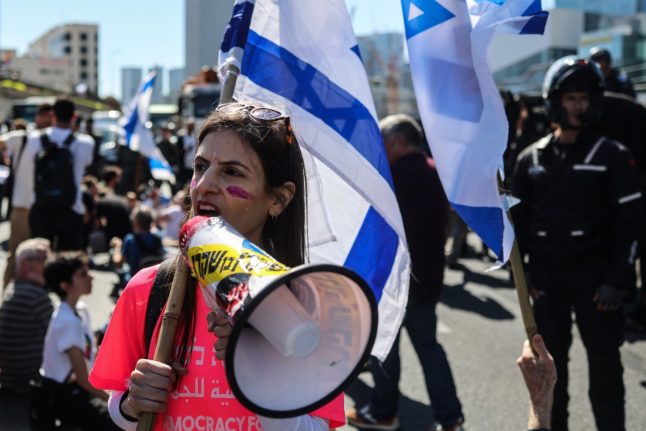Berlin under fire over Netanyahu visit

The German government is under pressure for hosting Israeli Prime Minister Benjamin Netanyahu, who was due to arrive in Berlin later Wednesday and facing strong criticism over planned legal reforms.
On the eve of Netanyahu's departure for Germany and ahead of a planned trip to Britain, 1,000 writers, artists and academics wrote to the two European nations' ambassadors urging their governments to scrap the visits.
"In the face of Mr. Netanyahu's dangerous and destructive leadership, and in light of a vast democratic civilian resistance against the destruction of state institutions by undemocratic law-making, we are asking that Germany and Great Britain swiftly announce" the cancellation of Netanyahu's visits, they wrote in the letter.
"If these visits go ahead as planned, a dark shadow will hang over them," they warned.
In Frankfurt, Meron Mendel, who heads the Anne Frank educational centre named for the teenage Holocaust victim, also said Berlin should have declined the visit.
"If an Israeli prime minister wants to get rid of common democratic values, then today is the worst time possible to invite him to Berlin," Mendel told public broadcaster Bayerischer Rundfunk.
Berlin should have clearly informed Netanyahu's office that it was not possible to receive him at this time, said the German-Israeli historian.
Chancellor Olaf Scholz's government must "finally realise" that "no business can be done with a far-right Israeli government", said Mendel, noting that the German-Israeli friendship is based on common values.
READ ALSO: Germany's Scholz 'disgusted' by Palestine president's Holocaust claim
'Normal guest'
The government of Netanyahu, which includes ultra-Orthodox and extreme-right parties, introduced its judicial reform package in January.
Netanyahu's government has argued the reforms are needed to limit judicial overreach, but protesters have decried them as threatening Israel's liberal democracy by weakening key checks and balances.
Ten consecutive weeks of nationwide demonstrations have followed, with critics also charging that the proposed changes aim to protect Netanyahu as he fights corruption charges in an ongoing court battle.
Ahead of Netanyahu's departure, critics took their protests to Ben Gurion airport.
"Dictator on the run" and "Don't come back", read placards held up by demonstrators near the airport, where a convoy of cars bearing Israeli flags circulated between the terminals, making them difficult to access, an AFP correspondent reported.
The controversy in Israel puts Germany at an uncomfortable position.
Germany and Israel forged strong diplomatic ties in the decades after World War II, with Berlin committed to the preservation of the Jewish state in penance for the Holocaust.
READ ALSO: Germany and Israel to mark 50 years since Munich Olympics massacre

A protester speaks through a loudspeaker at a demonstration against the government in Tel Aviv. Photo: picture alliance/dpa | Ilia Yefimovich
Successive German governments have described Israel's national security as a crucial priority of Berlin's foreign policy.
Netanyahu was to meet Scholz and President Frank-Walter Steinmeier on Thursday.
Steinmeier had recently expressed concern over the planned legislative overhaul.
Some Israelis living in Berlin have also called for protests against the visit.
Under the slogan "Defend Israel's democracy", activists have announced a demonstration at the Brandenburg Gate on Thursday afternoon.
Government spokesman Steffen Hebestreit on Monday said Netanyahu is the "elected prime minister of Israel and therefore also a normal guest in Germany".
According to Netanyahu's office, the prime minister and Scholz "will discuss diplomatic and security issues, first and foremost the Iranian issue, as well as regional developments".
It said the Israeli leader would "stress the need to prevent Iran from obtaining nuclear arms".
The meeting with Scholz is the first in their current roles, "and an expression of the special relations between Israel and Germany, and of the cooperation in a range of fields," added Netanyahu's office.
Peter Lintl of the German Institute for International and Security Affairs wrote in a commentary for Tagesspiegel daily that the visit offered Netanyahu relief from domestic pressures and "a stage where he could shine".
By Hui Min Neo with Jonah Mandel in Jerusalem
Comments
See Also
On the eve of Netanyahu's departure for Germany and ahead of a planned trip to Britain, 1,000 writers, artists and academics wrote to the two European nations' ambassadors urging their governments to scrap the visits.
"In the face of Mr. Netanyahu's dangerous and destructive leadership, and in light of a vast democratic civilian resistance against the destruction of state institutions by undemocratic law-making, we are asking that Germany and Great Britain swiftly announce" the cancellation of Netanyahu's visits, they wrote in the letter.
"If these visits go ahead as planned, a dark shadow will hang over them," they warned.
In Frankfurt, Meron Mendel, who heads the Anne Frank educational centre named for the teenage Holocaust victim, also said Berlin should have declined the visit.
"If an Israeli prime minister wants to get rid of common democratic values, then today is the worst time possible to invite him to Berlin," Mendel told public broadcaster Bayerischer Rundfunk.
Berlin should have clearly informed Netanyahu's office that it was not possible to receive him at this time, said the German-Israeli historian.
Chancellor Olaf Scholz's government must "finally realise" that "no business can be done with a far-right Israeli government", said Mendel, noting that the German-Israeli friendship is based on common values.
READ ALSO: Germany's Scholz 'disgusted' by Palestine president's Holocaust claim
'Normal guest'
The government of Netanyahu, which includes ultra-Orthodox and extreme-right parties, introduced its judicial reform package in January.
Netanyahu's government has argued the reforms are needed to limit judicial overreach, but protesters have decried them as threatening Israel's liberal democracy by weakening key checks and balances.
Ten consecutive weeks of nationwide demonstrations have followed, with critics also charging that the proposed changes aim to protect Netanyahu as he fights corruption charges in an ongoing court battle.
Ahead of Netanyahu's departure, critics took their protests to Ben Gurion airport.
"Dictator on the run" and "Don't come back", read placards held up by demonstrators near the airport, where a convoy of cars bearing Israeli flags circulated between the terminals, making them difficult to access, an AFP correspondent reported.
The controversy in Israel puts Germany at an uncomfortable position.
Germany and Israel forged strong diplomatic ties in the decades after World War II, with Berlin committed to the preservation of the Jewish state in penance for the Holocaust.
READ ALSO: Germany and Israel to mark 50 years since Munich Olympics massacre

Successive German governments have described Israel's national security as a crucial priority of Berlin's foreign policy.
Netanyahu was to meet Scholz and President Frank-Walter Steinmeier on Thursday.
Steinmeier had recently expressed concern over the planned legislative overhaul.
Some Israelis living in Berlin have also called for protests against the visit.
Under the slogan "Defend Israel's democracy", activists have announced a demonstration at the Brandenburg Gate on Thursday afternoon.
Government spokesman Steffen Hebestreit on Monday said Netanyahu is the "elected prime minister of Israel and therefore also a normal guest in Germany".
According to Netanyahu's office, the prime minister and Scholz "will discuss diplomatic and security issues, first and foremost the Iranian issue, as well as regional developments".
It said the Israeli leader would "stress the need to prevent Iran from obtaining nuclear arms".
The meeting with Scholz is the first in their current roles, "and an expression of the special relations between Israel and Germany, and of the cooperation in a range of fields," added Netanyahu's office.
Peter Lintl of the German Institute for International and Security Affairs wrote in a commentary for Tagesspiegel daily that the visit offered Netanyahu relief from domestic pressures and "a stage where he could shine".
By Hui Min Neo with Jonah Mandel in Jerusalem
Join the conversation in our comments section below. Share your own views and experience and if you have a question or suggestion for our journalists then email us at [email protected].
Please keep comments civil, constructive and on topic – and make sure to read our terms of use before getting involved.
Please log in here to leave a comment.